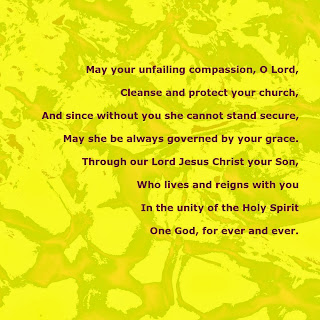 Lectionary: 237
Lectionary: 237When he read the letter,
the king of Israel tore his garments and exclaimed:
“Am I a god with power over life and death,
that this man should send someone to me to be cured of leprosy?
Take note! You can see he is only looking for a quarrel with me!”
We can well imagine the distress of the king of Israel upon receiving the letter from the king of neighboring Syria. These royal neighbors were usually at odds and Israel always came out the worse.
But we might also suppose, "Didn't the king know about Elisha and his authority to heal? Why wasn't his immediate, instinctive response to send Naaman the Syrian down to Elisha in the Jordan Valley?"
Obviously, his immediate reaction was defensive. A friend came to me once several years ago to discuss a problem. He said, "Now Ken, try not to get defensive." As if...! Neither one of us came out of that room satisfied.
The King and I were locked into ourselves, feeling like everything in the world is my problem and my responsibility; and "Why is everybody always picking on me?"
Recently I listened to several long stories of defensiveness at the hospital. Trying to help the woman out of that suicidal attitude I finally asked her, "Where are all these stories going?"
They were circling around the vortex of suicide. Given all these awful things happening to her, why not kill herself? I spoke to her about "walking back these victim stories to their source," perhaps to discover a moment when she was free, happy, and responsible. She might yet rewrite the story of her life with a role for Our Savior.
 In today's gospel we can see that Jesus is not a victim in that psychological sense.
In today's gospel we can see that Jesus is not a victim in that psychological sense. They rose up, drove him out of the town,and led him to the brow of the hill upon which their town had been built, to hurl him down headlong.But he passed through the midst of them and went away.The Baptized who belong to his body the Church with himself as our head do not react defensively to challenges. We know in our bones that we were commissioned only to turn our problems over to the Lord. HIs problems are not ours. If he wants us to do something more than that, he'll tell us, as Elisha told Naaman to go wash in the River Jordan.
I was sent once to a parish that, like many others, was rife with troubles. It wasn't long before I appeared in the chapel and said, "Lord, you've got a problem here! What are you going to do about it?"












